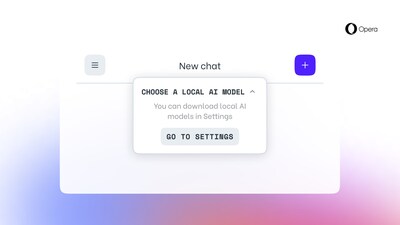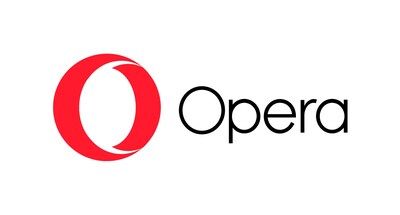Opera to become the first major browser with on-device AI through Local AI Models
Opera [NASDAQ: OPRA] is set to enhance its flagship browsers, Opera One and Opera GX, with on-device AI capabilities. Initially introduced in April 2024, Opera was the first to support local Large Language Models (LLMs) within a browser. This feature is now moving from early access to full integration across Windows, MacOS, and Linux platforms. Opera's AI will support over 2000 LLM variants from more than 60 families, elevating user privacy by limiting data transfer to servers.
Additionally, Opera's AI, Aria, has gained image understanding capabilities, allowing users to upload and query images. Opera's strategic investments include deploying an NVIDIA H100 AI data cluster and collaborating with Google Cloud to integrate Gemini models. These advancements highlight Opera's commitment to leading AI innovation in the browser market.
- Opera will integrate on-device AI in its major browsers, enhancing user experience and privacy.
- Support for over 2000 local LLM variants from more than 60 families.
- The feature will be available across Windows, MacOS, and Linux platforms.
- Aria AI now includes image understanding capabilities.
- Strategic deployment of NVIDIA H100 card-powered AI data cluster.
- Collaboration with Google Cloud to integrate Gemini models.
- Potential increased development costs associated with integrating and maintaining on-device AI.
- Risk of performance issues or bugs as the AI features transition from experimental to full integration.
- Dependence on strategic partnerships, such as with Google Cloud, which may pose risks if partnerships are affected.
Insights
Opera’s move to integrate on-device AI capabilities into its browser places it at the forefront of privacy-centric technological innovation. By allowing local processing of AI models, Opera reduces the need to transfer personal data to external servers, thus enhancing user privacy.
On-device AI can also lead to faster response times as data processing occurs locally, minimizing latency issues. This shift aligns with a growing industry trend towards edge computing, where data computation and storage occur closer to the data source instead of relying solely on centralized cloud servers.
Furthermore, the collaboration with Google Cloud and the use of powerful NVIDIA H100 card-powered AI data clusters indicate a significant investment in AI infrastructure. This suggests that Opera is not merely experimenting but is committed to a long-term strategy of integrating advanced AI capabilities into its products.
For tech investors, this is a substantial step forward as it shows Opera's strategic innovation and competitive edge in the browser market, which could translate into higher user engagement and retention, potentially driving revenue growth in the long term.
Opera's strategic advancements in on-device AI are likely to resonate well with privacy-conscious users, particularly in markets where data protection regulations are stringent. This could help Opera capture a significant share of users who prioritize privacy and efficiency. Introducing more than 2000 local LLM variants from over 60 families demonstrates a robust and versatile approach, catering to a wide range of user needs and applications.
Moreover, the company’s strategic partnership with Google Cloud and the deployment of the Nvidia-powered AI cluster highlight Opera's dedication to staying ahead in the AI race. Such collaborations not only bolster the technical capabilities of Opera’s AI but also enhance the brand's credibility and market position.
From an investment perspective, these actions indicate a forward-thinking approach and a commitment to technological leadership, which could lead to increased market share and potentially higher stock valuations as investor confidence grows in Opera’s innovative capabilities.
"Local AI developments in both hardware and software are currently a big focus in our industry. Opera is now announcing plans to move our on-device browser AI function from the Opera Developer testbed to our flagship Opera One browser," said Krystian Kolondra, EVP Browsers and Gaming.
The initial experimental release of on-device AI in Opera in April 2024 made the browser the first one to introduce such a feature to its audience as part of the company's AI Feature Drops Program. Since then Opera has added support for more than 2000 local LLM variants from more than 60 families of models to its browser. This step marked the first time local LLMs could be easily accessed and managed from a major browser through a built-in feature.
"With on-device AI support, we are pushing the boundaries of what is possible today and enabling new use cases, while adding an additional level of privacy for our users by limiting the need to transfer their personal data to servers while using AI," said Krystian Kolondra, EVP Browsers and Gaming.
Opera keeps shipping the newest innovative l AI features as part of its AI Feature Drops program into the developer stream of its browser.
New Image Understanding feature in Opera's browser AI
This week, Opera's browser AI, Aria, has gained the ability to understand images. This new feature allows users to upload images to Aria in the sidebar chat, and ask questions about them. The AI provides them with information about an image as well as with the necessary context about it.
Opera's commitment to the vision that soon all Opera users will be AI users is backed by the company's strategic investments, including its recent deployment of the NVIDIA H100 card-powered AI data cluster in
About Opera
Opera is a user-centric and innovative software company focused on enabling the best possible internet browsing experience across all devices. Hundreds of millions use Opera web browsers for their unique and secure features on their mobile phones and desktop computers. Founded in 1995 and headquartered in
![]() View original content to download multimedia:https://www.prnewswire.com/news-releases/opera-to-become-the-first-major-browser-with-on-device-ai-through-local-ai-models-302158176.html
View original content to download multimedia:https://www.prnewswire.com/news-releases/opera-to-become-the-first-major-browser-with-on-device-ai-through-local-ai-models-302158176.html
SOURCE Opera Limited









